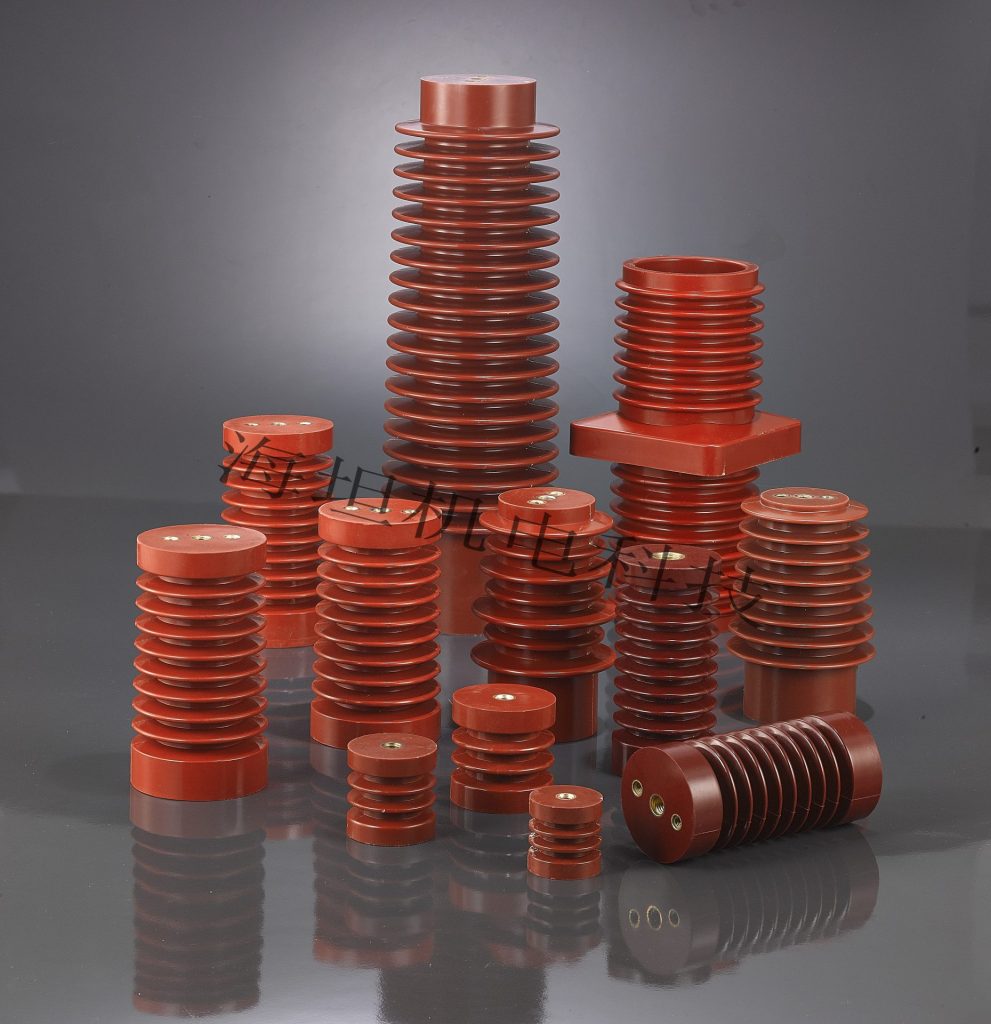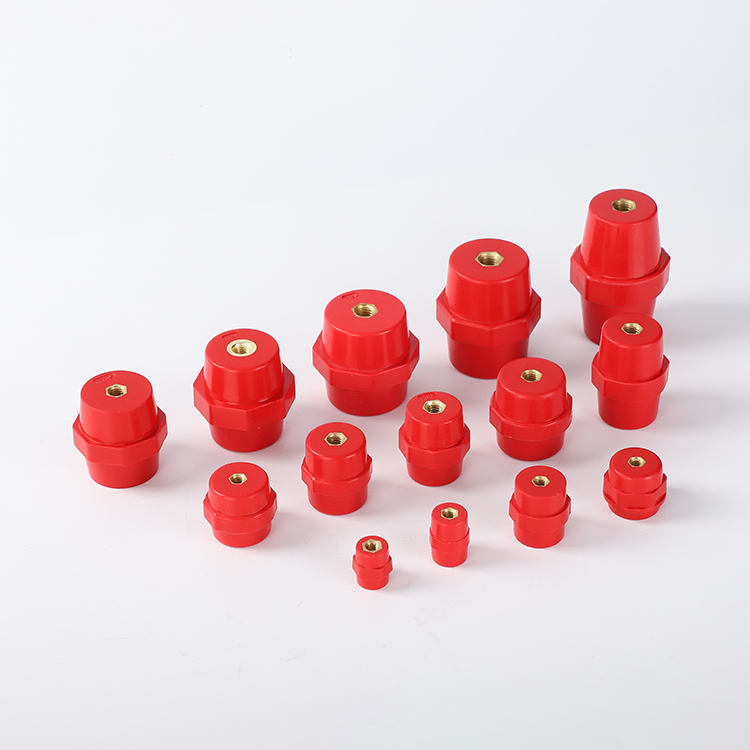Application and Performance Advantages of DMC Materials in Low Voltage Insulators
Introduction
In modern electrical systems, safety and reliability are directly tied to the quality of insulation materials. Low voltage insulators are a critical component in switchgear, busbar systems, and electrical cabinets, ensuring electrical separation, mechanical support, and long-term system stability. Among various insulation materials, DMC materials (Dough Molding Compound) have become a preferred choice thanks to their outstanding performance and versatility. This blog explores the application of DMC in SM insulators, highlighting its properties, performance advantages, and benefits for low-voltage systems.
Overview of DMC Materials
What are Dough Molding Compound (DMC) materials?
DMC materials are thermoset molding compounds made from unsaturated polyester resins, glass fibers, and mineral fillers. They are designed for compression or injection molding, producing components with excellent mechanical and electrical performance.
Properties of thermoset DMC material in insulators
High strength due to reinforced glass fibers.
Excellent dielectric properties for electrical insulation.
Heat and flame resistance, ensuring safe operation under stress.
Moisture resistance for use in challenging environments.
Dimensional stability, even under thermal or electrical loads.
Comparison of DMC with traditional insulation materials
Ceramics: High insulation but brittle and heavy.
Thermoplastics: Lightweight but less resistant to heat and deformation.
DMC composites: Combine electrical strength, toughness, and stability, making them a superior option for low voltage insulators.
What is an SM Insulator and Its Role in Low Voltage Applications
Define SM insulator and its structural features
An SM insulator is a type of low voltage insulator typically made from DMC composite electrical insulators. It is designed with compact dimensions, threaded holes, or slots for easy mounting of busbars and electrical components.
Role in low voltage insulator systems
SM insulators provide:
Electrical separation between conductors.
Mechanical support for busbars and switchgear parts.
Safety by preventing arcing and short circuits.
Common applications
Low-voltage switchgear: Preventing phase-to-phase faults.
Busbar systems: Supporting conductors while ensuring insulation.
Electrical cabinets: Providing compact, reliable mounting solutions.
Application of DMC in SM Insulators
Typical application of DMC in SM insulators
DMC’s thermoset nature ensures SM insulators are durable, heat-resistant, and safe for long-term use.
DMC insulators for low-voltage switchgear
They offer high dielectric strength and mechanical stability, ensuring switchgear panels operate reliably under load.
DMC insulators for busbar systems
DMC SM insulators withstand thermal and electrical stress, keeping busbars securely mounted and insulated.
Electrical cabinet SM insulators
In compact electrical cabinets, DMC insulators provide lightweight, space-saving, and safe insulation for distribution equipment.
Performance Advantages of DMC Materials in Low Voltage Insulators
Performance advantages of DMC materials
DMC composites combine mechanical, thermal, and electrical performance for critical low-voltage applications.
High mechanical strength and dimensional stability
Reinforced glass fibers give SM insulators excellent load-bearing capacity and resistance to deformation.
Excellent electrical insulation with DMC
Provides stable dielectric strength and prevents current leakage or arcing.
Heat resistance, moisture resistance, and flame-retardant properties
Withstands elevated operating temperatures.
Maintains insulation performance in humid environments.
Flame-retardant nature ensures compliance with safety standards.
Long-term durability and low maintenance
Unlike thermoplastics, DMC insulators do not warp, crack, or degrade easily, reducing replacement costs.
Comparison with other insulating materials
Better toughness than ceramics.
Higher heat resistance than thermoplastics.
Balanced performance for safety, cost, and reliability.
Key Properties and Benefits of DMC SM Insulators
Highlight key properties of DMC insulators
Strong, lightweight structure.
Excellent insulation.
Resistance to thermal, electrical, and environmental stress.
Benefits of DMC SM insulators
Enhanced safety
Reduces the risk of electrical faults, arcing, and short circuits.
Improved system reliability
Stable performance under electrical and thermal loads ensures longer service life.
Reduced overall operating costs
Durability and low maintenance minimize downtime and replacement expenses.
FAQ
Q1: Why choose DMC over thermoplastics for low voltage insulators?
DMC materials offer higher heat resistance, better dimensional stability, and longer lifespan compared to thermoplastics.
Q2: Can DMC SM insulators be used in humid environments?
Yes, DMC has excellent moisture resistance, making it suitable for outdoor and high-humidity applications.
Q3: Are DMC insulators environmentally friendly?
Yes, their long service life and reduced maintenance requirements contribute to sustainability.
Conclusion
DMC materials have proven to be a superior choice for low voltage insulators due to their excellent mechanical strength, dielectric performance, and durability. DMC SM insulators play a crucial role in switchgear, busbar systems, and electrical cabinets, ensuring safety, reliability, and cost-effectiveness. With growing demands for efficient and sustainable electrical solutions, the application of DMC in SM insulators is set to expand even further in the power distribution industry.
--- END ---
© Copyright 2024 China Haitan Electromechanical Technology Co., Ltd. All rights reserved.SUPPORT BY:JUNJ Privacy Policy


 E-mail:
E-mail:  No. 20 Lingyun Road, Dongfeng
No. 20 Lingyun Road, Dongfeng 
